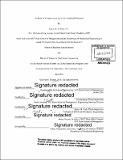Analysis of a diagnostics firm's pre-analytical processes
Author(s)
Thomas, Kevin M. (Kevin Michael)
DownloadFull printable version (8.209Mb)
Other Contributors
Leaders for Global Operations Program.
Advisor
Steven Spear and Steven B. Leeb.
Terms of use
Metadata
Show full item recordAbstract
Quest Diagnostics provides diagnostic information to clinicians, allowing them to make informed decisions on the appropriate course of treatment for their patients. Quest advertises an 8 a.m. next-day turnaround time for a subset of clinical tests, a service that provides competitive advantage for Quest. When this 8 a.m. turnaround time goal is missed, it causes ripple effects throughout the customer support organization resulting from increased client complaints. This research approaches Quest's late-release challenges through an analysis of phlebotomy services, courier route planning, and specimen accessioning to find precisely the source and cause of challenges preventing Quest from achieving their turnaround time goals. Prior to this research, Quest hypothesized that their logistics network could provide a consistent in-flow of patient specimens into their Marlborough, MA facility, improving the lab's likelihood of reaching their turnaround time goals. A simulation of a new demand-focused vehicle routing solution suggested that creating routes to provide a steady inflow of specimens would increase operating costs by 72%; what appeared to be an attainable, low-cost solution was found to be quite the opposite. We then provide an analysis of pre-analytical processes outside of logistics. Patient service centers (PSC) will soon provide 47% of the total specimen-volume to the Marlborough laboratory compared to 36% currently, thus evaluation of PSC processes and methodologies were conducted to identify ways to release a larger percentage of specimen volumes during midday courier pickups. Recommendations for process improvements to provide couriers with more patient samples during midday pickups are provided. Specimen accessioning processes and staffing were also analyzed, revealing that between 17%-24% of the subject tests results were unable to be resulted prior to 8 a.m. due to insufficient staffing for a second-stage accessioning task. Alterations to Quest's logistics network proved to be costly and low-impact, whereas slight alterations to phlebotomy-service processes and in-lab staffing could provide far higher value to Quest's customers with less impact to operations. By redirecting their focus to these other pre-analytical processes, Quest could focus their efforts on higher impact, lower cost options to improve operations and meet their turnaround time goals.
Description
Thesis: S.M., Massachusetts Institute of Technology, Department of Mechanical Engineering, 2016. In conjunction with the Leaders for Global Operations Program at MIT. Thesis: M.B.A., Massachusetts Institute of Technology, Sloan School of Management, 2016. In conjunction with the Leaders for Global Operations Program at MIT. Cataloged from PDF version of thesis. Includes bibliographical references (pages 73-75).
Date issued
2016Department
Leaders for Global Operations Program at MIT; Massachusetts Institute of Technology. Department of Mechanical Engineering; Sloan School of ManagementPublisher
Massachusetts Institute of Technology
Keywords
Mechanical Engineering., Sloan School of Management., Leaders for Global Operations Program.